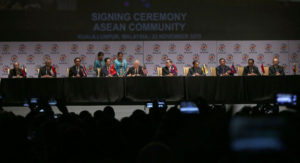Media Censorship and Government Accountability in Laos
Spokespeople within Laos announced on April 6 that press regulations and restrictions on foreign media will not obstruct foreign journalists in their coverage of the upcoming ASEAN Summit, to be hosted by Laos in November. Vorasack Pravongviengkham, the Deputy Director of Laos National Radio, emphasized that new regulations that came into effect in January requiring foreign media reports to undergo government screening will not apply to the majority of coverage by foreign outlets of the ASEAN Summit. Only films and documentaries, he stated, would be subjected to screenings.

Press restrictions within Laos apply to domestic as well as foreign media outlets. Though the national constitution technically guarantees freedom of the press, it also specifies penalties involving varying terms of imprisonment for media reporters who issue “propaganda” against the Communist state, engage in defamation or misinformation, or threaten “national culture.” The lack of prosecution, punishment, and intimidation of media reporters thus far stems largely from practices of self-censorship within the media community. Media outlets are expected to draw largely from government information in constructing news reports, while state officials practice media censorship and actively disseminate media content rules. In fact, most newspaper, television, and radio outlets in Laos are affiliated with or run by the government.
Various laws have reinforced media restrictions and censorship. The Media Law of 2008 officially affirmed media reporters’ right to access public records, receive information from state officials, and provide news coverage. In reality, however, journalists are often unable to secure meetings with or obtain information from government representatives. In 2014, the government of Laos also took steps to place restrictions on web-based information and news through an Internet censorship decree. Under the new law, website administrators must review web user content before it is posted and actively block or refrain from providing services to those who oppose government regulations and policies. Additionally, the law empowers both the information, culture, tourism, and public security sectors to investigate and monitor web content and users.
Due to the extensive restrictions outlined above, media outlets are unable to act as watchdogs of state policy and the quality of governance, particularly within the context of controversial social issues. For example, the government of Laos has prevented international and independent media coverage of the resettlement and treatment of the Hmong population within the country, preferring instead to issue its own reports. Moreover, the recently enacted Internet decree has constrained the viability of online spaces as tools for the monitoring of government accountability. Two individuals have thus far been arrested for posting online information and documents related to sensitive topics such as foreign land concessions and police extortion. Such incidents suggest that the lack of autonomy of domestic news media sources within Laos carries significant and negative implications for government accountability and legitimacy.
